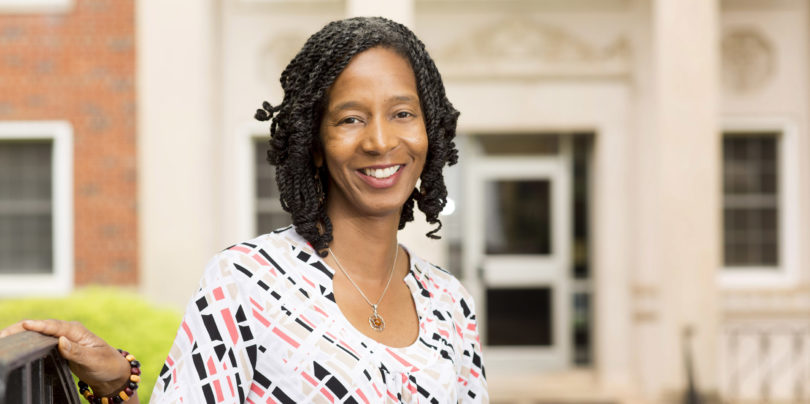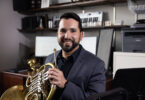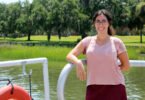Lesley Feracho, an associate professor in the department of Romance languages and associate director of the Institute for African American Studies, helps students learn to develop critical thinking and to (re)discover the joys of reading.
Where did you earn degrees and what are your current responsibilities at UGA?
I received my Bachelor of Arts in Spanish from Cornell University and my master’s and doctoral degrees from Duke University. I am currently an associate professor of Spanish at UGA and the associate director of the Institute for African American Studies.
When did you come to UGA and what brought you here?
I came to UGA in 1996 as I completed my doctoral dissertation. A job opened up as a joint position in Romance languages and African American studies, and one of my committee members who had gotten his doctoral degree here made me aware of it. Such an opportunity, to work in both areas, would allow me to do my work in African diaspora literature of the Americas and therefore was a very attractive one. As a graduate student finishing up and getting ready to enter the workforce, the opportunity to interview for a job like this was one I had to take advantage of.
What are your favorite courses and why?
My favorite courses have been the ones that allow me to take a look at compelling and possibly understudied literary, historical and cultural dynamics in the Americas (specifically Latin America, the Hispanophone Caribbean and Latino/a communities in the U.S.) and create dialogues between the students, myself and the writers. Over the years I have developed courses looking at different aspects of the African diaspora in the Hispanophone Americas in particular (for example Caribbean women’s literature, and literary relationships from African-Americans to Afro-Latinos) while also dialoging with Brazilian literature, and I have very much enjoyed teaching those courses and being a part of the students’ discovery of writers, themes and approaches they might not have thought of before.
What interests you about your field?
In part I have very much appreciated the opportunities to explore historical, artistic and political developments throughout the Americas through literature and different cultural practices. It has enabled me to get a deeper, more nuanced understanding of the region, its history and complex interconnections on a diasporic and transnational level. The ability as well to engage different issues in two languages that I love—Spanish and Portuguese—is also a very big part of my great interest in this field.
What are some highlights of your career at UGA?
I have been here a while so there are a few. Some of the highlights have been the firsts. My first undergraduate class—while daunting—was special because it marked my entrance into academia and similarly, my first graduate class was an exciting experience. Another highlight has been the opportunity to have meaningful dialogues with different scholars, activists and artists. A few years after I arrived I was given the opportunity by my colleagues in Portuguese to give the opening remarks for the visit of then Brazilian Senator Benedita da Silva (the first black female senator in Brazil) in the Chapel. That experience, along with getting to speak to her at length, is one I will never forget.
How does your research or scholarship inspire your teaching, and vice versa?
My research and scholarship in Latin America and the Caribbean has enabled me to constantly explore the complex interactions of literary and cultural practices with important historical and political developments in the Americas, focusing on understudied and marginalized voices. Teaching allows me to create exciting dialogues about these cultural, literary and historical practices with students. The dialogues created in those classrooms (on both the undergraduate and graduate level) then in turn inspire my research and the desire to share with others in my field and beyond.
What do you hope students gain from their classroom experience with you?
More than specific knowledge that one can memorize, I hope that students learn to develop critical thinking and to (re)discover the joys of reading—engaging writers and other scholars—to explore themes and concepts they might not have thought of before. In terms of specific knowledge, I do want them to gain a greater understanding of the diverse communities of the Americas, in particular throughout the African diaspora, and the kinds of connections and strategies of action and agency, sometimes surprising ones, that exist alongside the differences that they may already be aware of.
Describe your ideal student.
My ideal student is one who is open to discovery. It is one who is excited about acquiring knowledge and engaging in critical thinking and debate as a way of opening up new avenues and gaining insight into different cultural experiences—through literature and other cultural practices like film and music, for example. But it is also a student who knows there is so much to learn and is not afraid of but rather embraces that challenge and sees the classroom (or other learning spaces) as an exciting place to do that with fellow students and with me.
Favorite place to be/thing to do on campus is…
I think one of my favorite things to do, more than visiting a place, is to take a leisurely walk through campus, sometimes listening to my favorite music. It is a chance to relax and appreciate the campus in a way that walking to and from class doesn’t give me the opportunity to do.
Beyond the UGA campus, I like to…
Catch great movies at Ciné, hang out with friends (usually involving great food), listen to live music in Athens, as well as catch live music and theater in Atlanta.
Community/civic involvement includes….
During my time at UGA and in Athens, engaging with young people in particular has been important to me. I have and continue to pursue avenues to create meaningful, empowering relationships that help foster greater opportunities for Athens’ citizens, such as speaking with students at Freedom University, alongside support for organizations such as U-Lead, helping with translation services at parent teacher conferences or church activities in service to Athens’ community. Through my work at the Institute for African American Studies, for example, I look forward continuing to foster more opportunities to engage the Athens community. In terms of local and global connections, as a former adviser for the Costa Rica Study Abroad program, it has been a special experience for me to be a part of the opportunities for students to not only study abroad and develop a greater sense of global connections and transnational contexts through relationships with host families and participation in community events there but also develop a stronger commitment to establish important bonds with their local communities here in Athens.
Favorite book/movie (and why)?
As an avid reader there are many, but one of my favorites outside of my field is “Great Expectations” by Charles Dickens. In particular, I have always been moved by the story of Pip’s sometimes heartbreaking negotiation of class and family as seen through his relationship with Joe (one of my favorite characters). Within my field, every time I read it, Edwidge Danticat’s “The Farming of Bones” has moved me with her exploration of complex national contexts and a troubling historical moment through very intimate interpersonal relationships.
Proudest moment at UGA?
There are a few but some of my proudest have to do with my work with graduate students. Seeing my doctoral student through to receiving her Ph.D. and hooding my first Ph.D. student at the graduation ceremony especially come to mind. Being able to celebrate the results of their hard work and our scholarly partnership and playing a part in their realization of such an important undertaking and the beginning of a professional journey were definitely some of my proudest moments.







